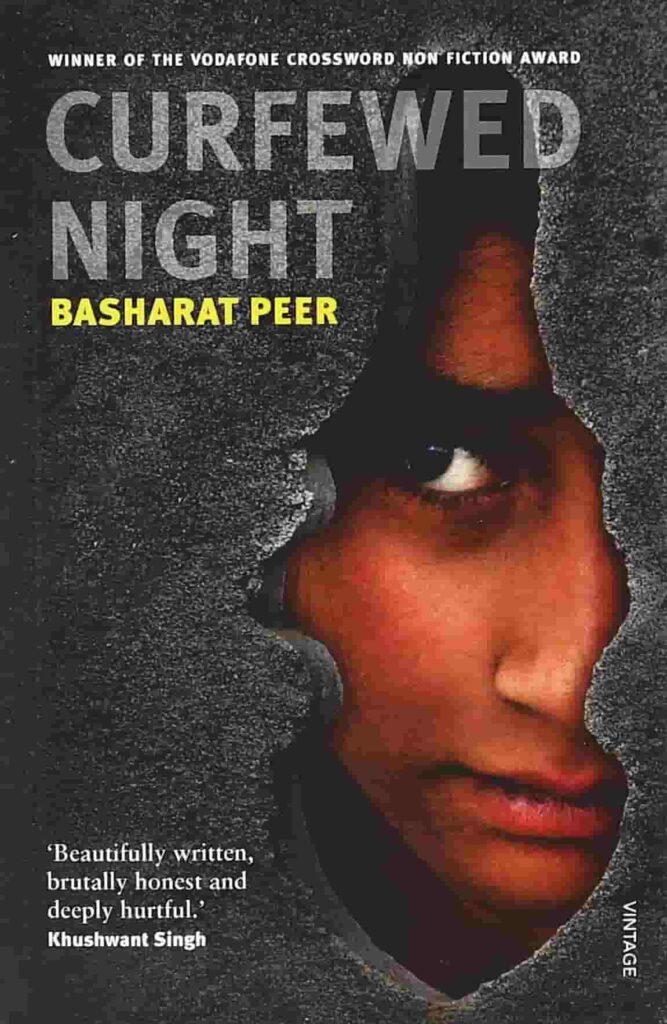Why I Picked This Book?
I wanted to learn more about Kashmir, so I turned to books that explore the region in depth. There’s truly no better way to understand Kashmir than through the lived experiences of its people. Their narratives offer valuable insight into how ordinary Kashmiris perceive the rest of India, their views on the military presence, and the everyday struggles they endure. In search of a deeper understanding, I chose to read Curfewed Night.
The Book
Curfewed Night is a memoir of a Kashmiri youth documenting the period between 1987-2008. An insider’s view into the complex world of Kashmir, the conflict, and how a whole generation has been affected due to it. A Personal memoir of the author mixed with reportage and history of Kashmir that gives you a personal and tragic account of the Kashmir conflict.
Curfewed Night starts with the author narrating about his village, where he was born, and the general atmosphere during his early childhood days. Taking you through the period of the late 80s, when in 1987 the Indian government rigged the state election in favour of Congress and the National Conference. This triggered protests all over Kashmir, which were brutally suppressed by the Indian government. The suppression led to anti-India feelings among the Kashmiri youth, and it soon took the form of pro-independence protests across Kashmir. To control the pro-independence protest, the security forces killed and tortured many Kashmiris, including separatist leaders. This flared up the situation, alienating the people of Kashmir from India and prompting youth to take up militancy.
The author captures how things started to change in the early 90s. In their school, anti-India sentiments were peaking, and the seniors in the school told them not to sing the national anthem even if the principal says so. Also, the empty chairs in the classrooms tell that many of their pandit classmate left Kashmir for good. Increase in pro-independence protests and increase in military presence in Kashmir. The increase in militancy, killing, and torture of civilians by security forces, the fear of militants, all these factors were too much for a common Kashmiri to get used to. He recalls how they used to cheer for Pakistan in an India-Pakistan match and how there was a sense of sympathy and respect for the youth who picks up the gun. The slogans of “Aazadi”, bullets, bunkers, armored vehicles, and tear gas all became part and parcel of Kashmiri day-to-day life.
Curfewed Nights also captures the history of Kashmir, the composite culture, and the various rulers who ruled Kashmir over the period. You will get to know some interesting and informative stories. His school/college days in Delhi also give you a glimpse of what the rest of India thinks and how they treat Kashmiris. The attack on the Indian Parliament and how it affected the lives of Kashmiri Muslims living in Delhi. Like SAR Gilani, a Delhi university lecturer who was arrested in connection with the Parliament attack, was later acquitted by the court.
Curfewed Nights captures the tragic and barbaric human rights abuses in Kashmir. There were so many, and most of these are unheard of by the general population in the rest of India. Only the academics, human rights activists, and Kashmir sympathizers know about the news which are censored for the common people. And, when they raise their voices against it, they are termed as anti-national or anti-India, working on behalf of foreign forces. The easiest way to discredit anyone.
The Author, Bashrat Peer, interviewed many people in Kashmir who spent years in jail and a torture center. They were either former militants or civilians who were picked up by security forces on suspicion of being militants. The stories they narrated about these torture centers are spine-tingling and sometimes heartbreaking. More distressing is the fact that they are abandoned by the leaders who encouraged these young Kashmiris to take up guns.
Curfewed Night offers a compelling insider’s perspective on Kashmir and the ongoing conflict in the region. Drawing from his personal memories, lived experiences, and journalistic reporting, the author effectively chronicles the transformations that unfolded in Kashmir between 1987 and 2008.
About The Author
The author, Basharat Peer, is an Indian journalist born in Kashmir but currently based in New York. He has been associated with various publications such as Rediff, Tehelka, Foreign Affairs, The Guardian, FT Magazine, The New Yorker, The National, and The Caravan as a journalist. He currently runs his blog named India Ink.
Our Verdict
The memoir presents an honest and deeply moving account of Kashmir and its conflict, seamlessly woven into the author’s personal story. Though tragic, frustrating, and often heartbreaking, the book remains an essential read for anyone seeking to understand Kashmir beyond the mainstream narrative.
